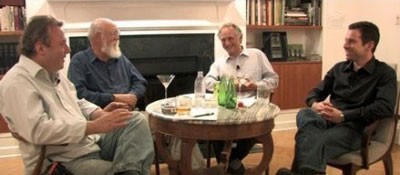
RD
The "Four Horsemen" of the
Atheocalypse (l to r):
Christopher Hitchens, Daniel Dennett, Richard
Dawkins, Sam Harris
Atheism in America
By
Julian Baggini
Financial Times, February 2012
Edited by Andy Ross
Matt Elder, who lives in Festus, Missouri, says with a smile that when he
goes out wearing his black T-shirt with its large scarlet A — the symbol of
the atheist Out Campaign inspired by Richard Dawkins — "you'll see mothers
bring their children a little closer and step a little quickly away". Elder
is not militant and tries to be as accommodating as he can without being a
hypocrite.
Churches are the main hubs for volunteer work, which is
much more central to life in the welfare-state free America than it is in
Europe. As Daniel Dennett says, "The sad truth is that in many parts of the
country, if you want to join forces with your neighbors and do something
good, and you look around for an organization that will help you do that,
thatís the churches."
Religious freedom was the reason why the
puritan Pilgrim Fathers boarded the Mayflower in 1620. They were followed by
other nonconformists wanting to escape countries whose established churches
made it difficult for people of other denominations to thrive. The founding
fathers were determined to ensure that the United States government should
have no role in determining the beliefs of its citizens.
But the
strict separation of church and state has not stopped many seeing America as
a Christian nation. Many Christians campaign for both prayer and the
teaching of creationism in schools. Other legal disputes are still being
fought over monuments such as crosses and the Ten Commandments on publicly
owned land.
A now famous University of Minnesota study concluded that
Americans ranked atheists lower than Muslims, recent immigrants, gays and
lesbians, and other minority groups in "sharing their vision of American
society". No wonder atheist groups talk of modeling their campaigns on the
civil rights, gay, and women's liberation movements. "We want people to
realize that some of their best friends are atheists, some of their doctors,
and lawyers and fire chiefs and all the rest of them are atheists," says
Dennett.
Sam Harris is one of Americaís best-known atheists. His 2004
book, The End of Faith, sold over half a million copies. He agrees that the
situation for atheists is "analogous to being gay and in the closet for many
people". But he says "it's a losing game to trumpet the cause of atheism and
try to rally around this variable politically. I've supported that in the
past, I support those organizations, I understand why they do that. But, in
the end, the victim group identity around atheism is the wrong strategy.
It's like calling yourself a non-astrologer. We simply don't need the term."
A report from the Pew Research Center last November showed that 53
percent of Americans say it is necessary to believe in God to be moral. That
is one reason why many are afraid of coming out, to the extent that both
American Atheists and the American Humanist Association (AHA) will, on
request, send mailings to members under plain covers.
The number of
people who don't believe in God in the United States is said to have doubled
over the past decade, with even faster growth among the young. Validating
that claim is difficult, but surveys agree that atheism is on the rise.
Books by the Four Horsemen — Sam Harris, Daniel Dennett, Richard Dawkins,
and the late Christopher Hitchens — have all been New York Times
best-sellers, with sales in the hundreds of thousands.
The Global War On Christians
By Ayaan Hirsi Ali
Newsweek, February 2012
Christians are
being killed in the Islamic world because of their religion. It is a rising
genocide that ought to provoke global alarm. In some countries government
agents burn churches and imprison parishioners. In others, rebel groups and
vigilantes murder Christians and drive them from their homes.
Media
reticence on the subject may be in part due to lobbying groups that have
persuaded leading public figures and journalists in the West to think of
each and every example of perceived anti-Muslim discrimination as an
expression of a systematic and sinister derangement called Islamophobia.
But a fair-minded assessment of recent events and trends leads to the
conclusion that the scale and severity of Islamophobia pales in comparison
with the bloody Christophobia currently coursing through Muslim-majority
nations from one end of the globe to the other.
Christian minorities
in many majority-Muslim nations have lost the protection of their societies.
In countries with radical Islamist movements, vigilantes often feel they can
act with impunity. The old idea that non-Muslims in Muslim societies deserve
protection has all but vanished from wide swaths of the Islamic world.
Western governments need to be clear that criticism of Islam is not
Islamophobia. The West can help religious minorities in Muslim-majority
societies by making its development aid and trade and investment
relationships conditional on the protection of the freedom of conscience and
worship for all citizens.
AR In my opinion, the proper response here is to regard the recent manifestations of atheism as expressions of the radical demystification of moral life characteristic of very early Christianity and hence to extend atheist solidarity to "Reform" Christians in order to form a scientifically respectable foundation for a faith in the progress of life on Earth that can defeat Islamic fundamentalism and go on to fructify Globorg.
